5. The Dark Half (1993)
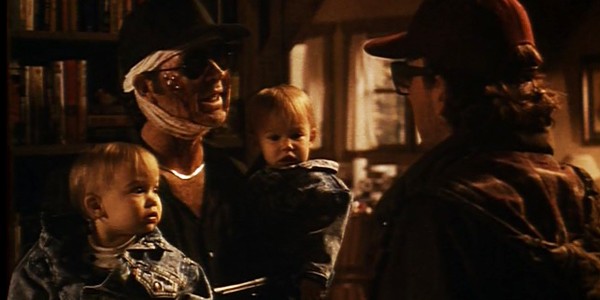
George Romero’s adept 1993 big screen adaptation of Stephen King’s 1989 novel doesn’t get nearly enough love, and that’s a shame as it’s definitely one of the director’s most underrated works, and his finest film from the 90s. Starring the always excellent Timothy Hutton (Ordinary People) in a challenging dual role as best-selling horror author (and thinly-veiled King surrogate) Thad Beaumont and his fictional alter ego George Stark, somehow crazily brought to life.
A fast-paced and entirely unsettling tale that treads closely to the oft-told Jekyll-and-Hyde chestnut but with other elements deeply personal to King, the duelling doppelgänger mystification is further obfuscated by Romero’s sharp direction and spooky set pieces.
“The scenes are so beautifully done,” wrote New York Times critic Vincent CAnby, “that Hitchcock might have admired them, or at least their technical facility.”
Anyone who may have written off The Dark Half as a middling work from two masters just phoning it in are in desperate need of both a knuckle sandwich and a second look. It may not have the kismet collaborative vigor of Creepshow, but it’s an intriguing horror-thriller all the same. Highly recommended.
4. Fire in the Sky (1993)
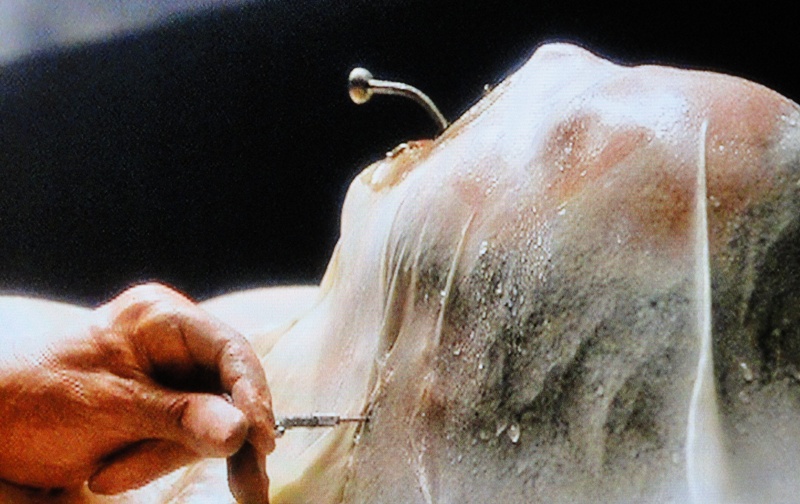
With more than some passing similarities to the 1989 “fact-based account” of an alleged extraterrestrial encounter, Communion, comes Robert Lieberman’s Fire in the Sky. Adapted by Tracy Tormé, based on Travis Walton’s biographical 1978 book “The Walton Experience”, Fire in the Sky stars D.B. Sweeney as Walton, an experienced logger who vanished while working with his logging crew in Arizona’s Apache-Sitgreaves National Forest in early November, 1975. When Walton reappeared five days later, after an exhausted search by law enforcement led to nothing, he claimed he was abducted by a UFO.
As detailed in the film and in actuality, Walton’s encounter received much mainstream attention and publicity and is frequently considered one of the best-known instances of alleged alien abductions in the world. While naysayers claim it’s all an elaborate hoax, one thing’s for sure: you can’t ever shake the image of evil aliens smacking a glob of sickly muck into the forced open mouth of a terrified restrained abductee because it’s “BASED OFF A TRUE STORY”!!!
3. Tales from the Crypt: Demon Knight (1995)
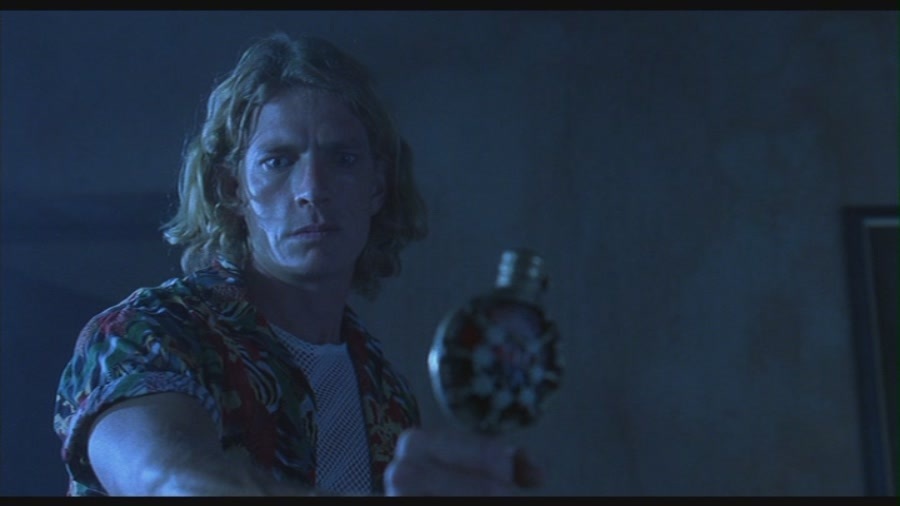
For whatever unlucky reasons, HBO was just never able to extend their playful and popular pay-TV horror series Tales from the Crypt into a successful film franchise and, as 1995’s Demon Knight fully attests, it’s a crying shame.
Directed by Ernest Dickerson, who at the time was transitioning from being a cinematographer to a full-fledged director (as a DP he was Spike Lee’s go-to guy but with 1992’s Juice, was making his own name as an up-and-coming director), backed by an exceptionally strong cast (Jada Pinkett Smith, William Sadler, and Billy Zane amongst them), and working from a strong script that balanced both big scares and steady laughs, Demon Knight should have been a fright fan’s dream come true. Alas, it made only a modest impact in theaters and on home video.
There’s something off about Frank Brayker (Sadler), a stranger roaming around New Mexico who’s just made his way into a boarding house, formerly a church, with an even odder gent known as the Collector (Zane) dogging his heels. The Collector has a police escort and claims that Brayker has some keys that belong to him.
Of course the Collector is only telling half truths, really what he’s after are amulets that contain drops of blood belonging to JC, amulets that Brayker knows can be used for good or evil, depending on who holds them, and soon a siege is underway with the boarding house’s mostly affable residents joining Brayker set against the Collector and his crew of ticked-off demons. It all amounts to some fast-paced and gory fun (the practical effects are excellent) that will appeal to fans of enticing splatter films from Peter Jackson and Sam Raimi. If you missed out on Demon Knight back in the day, well there’s no time like the present to get reacquainted. A really good bad time is guaranteed.
2. Jacob’s Ladder (1990)
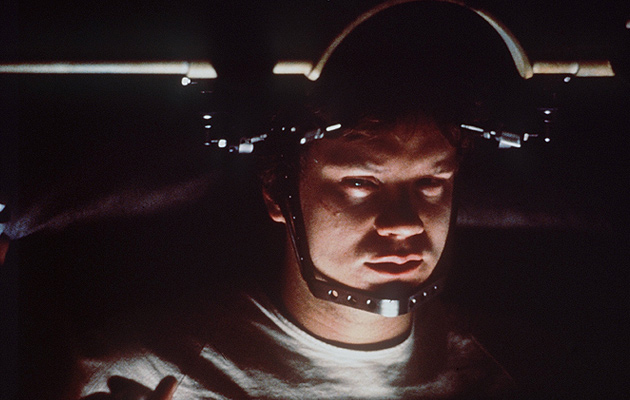
Challenging, complex, and creepy as can be, Adrian Lyne’s theological horror film Jacob’s Ladder is a thrilling exploration not just of post-traumatic stress disorder, but of death, and the afterlife as well.
Tim Robbins is Jacob Singer, a Vietnam vet haunted by his experiences in the shit as well as being tormented by half-seen humanoid tormentors that seem to signal his mental collapse. His paranoiac visions, he soon finds out, are shared by the surviving members of his old unit, and when he reunites with his old war buddies they seem to share a personal hellscape that’s not unlike the menacing metaphysical paintings of Francis Bacon (one of Lyne’s biggest influences on the film).
Jacob’s Ladder is a stylish, at times harrowing, film about fear, the unknown, and the emotional and mental descent of our ill-met hero. Effectively told through formalist means (the quick cuts and subliminal flashes amp up some truly nightmarish sequences, especially those in the surgical chamber), and with a truly daring screenplay from Bruce Joel Rubin, this is a film that will hound you for days afterwards. Miss it at your own peril.
1. In the Mouth of Madness (1994)
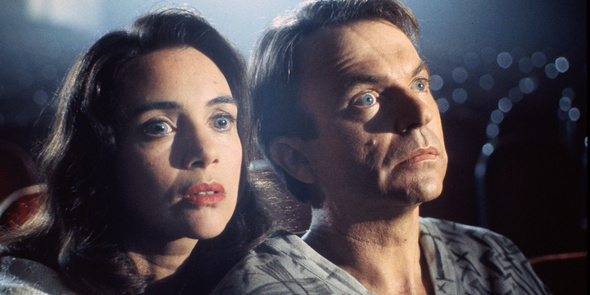
Die hard John Carpenter fans know that this Lovecraftian deep cut, In the Mouth of Madness, also the third installment in the thematically bound Apocalypse Trilogy (preceded by The Thing and Prince of Darkness), is one of the director’s most marvellously realized mindfucks, a ferociously playful, and startlingly surrealist success.
But it’s not just the devout Carpenter acolytes that worship at the altar of this film, it was well regarded by the prestigious Cahiers du cinéma (where it was ranked the 10th best film of 1995), and devotees of both Stephen King and H.P. Lovecraft are appreciative of the movie’s acknowledged inspirations. And yet when it first dropped in 1994 it made barely a ripple at the box office where it barely broke even.
Ostensibly one wild WTF-is-going-on flashback centering on a straightjacketed John Trent (Sam Neill) explaining to his strangely laissez-faire disorders analyst Dr. Wrenn (David Warner) how he was, until recently, a successful insurance investigator. Charged with retrieving a manuscript from reclusive horror novelist Sutter Cane (Jürgen Prochnow) –– an amalgam of King and Lovecraft –– in what should have been a routine roundup.
Things go from strange to stranger as Trent, accompanied by Cane’s editor, Linda Styles (Julie Carmen), tracks the author down to a New Hampshire hamlet, Hobb’s End, which is straight out of the author’s dark imaginings. Also steeping in the sludge is an epidemic of violence somehow connected to Cane’s work and the tantalizingly terrifying prospect that Cane can affect reality with his writing.
The meta-narrative about insanity is also a smart twist and, once you’ve made it to the end of this mind-bending digression you’re sure to tremble if you ever hear the words: “Do you read Sutter Cane?”
Author Bio: Shane Scott-Travis is a film critic, screenwriter, comic book author/illustrator and cineaste. Currently residing in Vancouver, Canada, Shane can often be found at the cinema, the dog park, or off in a corner someplace, paraphrasing Groucho Marx. Follow Shane on Twitter @ShaneScottravis.